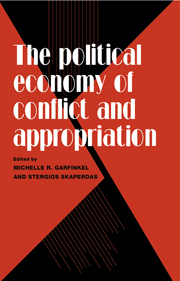Book contents
- Frontmatter
- Contents
- List of contributors
- Acknowledgments
- 1 Introduction: Conflict and appropriation as economic activities
- 2 Anarchy and its breakdown
- 3 Towards a model of territorial expansion and the limits of empire
- 4 Predation and production
- 5 Competitive trade with conflict
- 6 Increasing returns to politics in developing countries with endogenous protection in a fixed-factor model
- 7 Demosclerosis, or special interests “R” us: An information rationale for political gridlock
- 8 Deforestation, investment, and political stability
- 9 Violence and the assignment of property rights on two Brazilian frontiers
- Index
1 - Introduction: Conflict and appropriation as economic activities
Published online by Cambridge University Press: 30 December 2009
- Frontmatter
- Contents
- List of contributors
- Acknowledgments
- 1 Introduction: Conflict and appropriation as economic activities
- 2 Anarchy and its breakdown
- 3 Towards a model of territorial expansion and the limits of empire
- 4 Predation and production
- 5 Competitive trade with conflict
- 6 Increasing returns to politics in developing countries with endogenous protection in a fixed-factor model
- 7 Demosclerosis, or special interests “R” us: An information rationale for political gridlock
- 8 Deforestation, investment, and political stability
- 9 Violence and the assignment of property rights on two Brazilian frontiers
- Index
Summary
An American businessman, recently arrived in Moscow to open an office, was met at his hotel by five men with gold watches, pistols and a print-out of his firm's net worth. They demanded 7% of future earnings. He took the first flight to New York, where muggers are less sophisticated.
(The Economist, 1994)Although crime, conflict, and appropriation are common activities in all societies, the regularly reported incidents like the one just described from Moscow and other post-Soviet localities surprise even Westerners (who have been hardened by tales of muggings in New York and celluloid violence). The source of the surprise, at least from the perspective of most economists, is simply the failure of apparently rational individuals to engage in mutually advantageous trade spontaneously. In the absence of external or internal restraints, however, an individual with easy access to a pistol might find it more convenient to take what he wants from others outright by threatening to use force than to obtain what he wants through peaceful trade. As a general principle, resources can be used not only for production but also for appropriative purposes such as for theft and warfare. Individuals and groups can either produce and thus create wealth or seize the wealth created by others.
- Type
- Chapter
- Information
- The Political Economy of Conflict and Appropriation , pp. 1 - 14Publisher: Cambridge University PressPrint publication year: 1996
- 3
- Cited by



